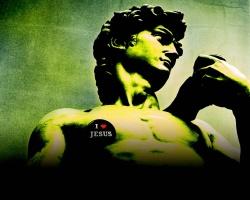My wife and I recently taught Sunday School to 4- and 5-year-olds at our church. The lesson was about John the Baptist, so we gave the kids a spin at acting like first-century hippies. They dressed up in camel’s hair (a burlap sack) and ate locusts (fake bugs) and wild honey (from Whole Foods). The kids got a feel for life as a radical.
However, the curriculum told us to teach the main point that John the Baptist told the crowds, “Jesus is God’s Son.” The leader’s manual instructed us to emphasize the point by having the kids say, “Jesus is God’s Son,” as John the Baptist did, and telling them they, like John, are supposed to carry that message to the world.
Welllll, we just couldn’t manage to teach that lesson. Why? Because John never said, “Jesus is God’s Son.” He preached repentance (“Make straight the way for the Lord”) and said Jesus is the Lamb of God, which may seem like we’re arguing semantics; but it makes a difference in the story.
David Was No Giant-Slaying Hero
While my wife was pregnant with our first child, we determined we would not intentionally misconstrue for our kids what the Bible says. Our children won’t be learning the story of Noah’s ark is about how much God loved Noah and the animals, and they won’t learn Jesus spent most of His time telling people how to get into heaven. I learned those ideas in Sunday School as a child, and I have found the process of unlearning to be very painful.
I’ve also had to unlearn that Jacob, Moses, David and others were godly heroes; the Bible renders them as rascals whom God used anyway, which is a much better and truer story than the Christianized version. As educational retellings go, describing John the Baptist as a man who preached “Jesus is God’s Son” is many degrees better than, say, describing David as a giant-slaying hero who can inspire you to slay your giants. Still, it gives the wrong idea about what John the Baptist would have believed in his own social and religious context; and it suggests a willy-nilly approach to Bible education that is all too common in the church.
In a chapter about David in Eugene Peterson’s The Jesus Way, Peterson complains about Christians’ odd tendency to idolize the beloved king of Israel—he of eight wives and a harem of concubines, who killed thousands (including a rival lover) and was indifferent to his own progeny. There is a lesson for us in the story of David, says Peterson, but it’s not the one we normally apply:
The life of David is a labyrinth of ambiguities, not unlike our own…David is not a model for imitation; David is not a candidate for a pedestal. The David story is an immersion in humanity…The story of David is not a story of what God wants us to be but a story of God working with the raw material of our lives as He finds us.
When we heroize a messy figure, such as David, or Christianize a first-century Jew, such as John, we misconstrue what it means to be students of the Bible. We should not be striving to help anyone in our spiritual tutelage understand what we believe about the Bible. We should be striving to help them know what the Bible actually says.




